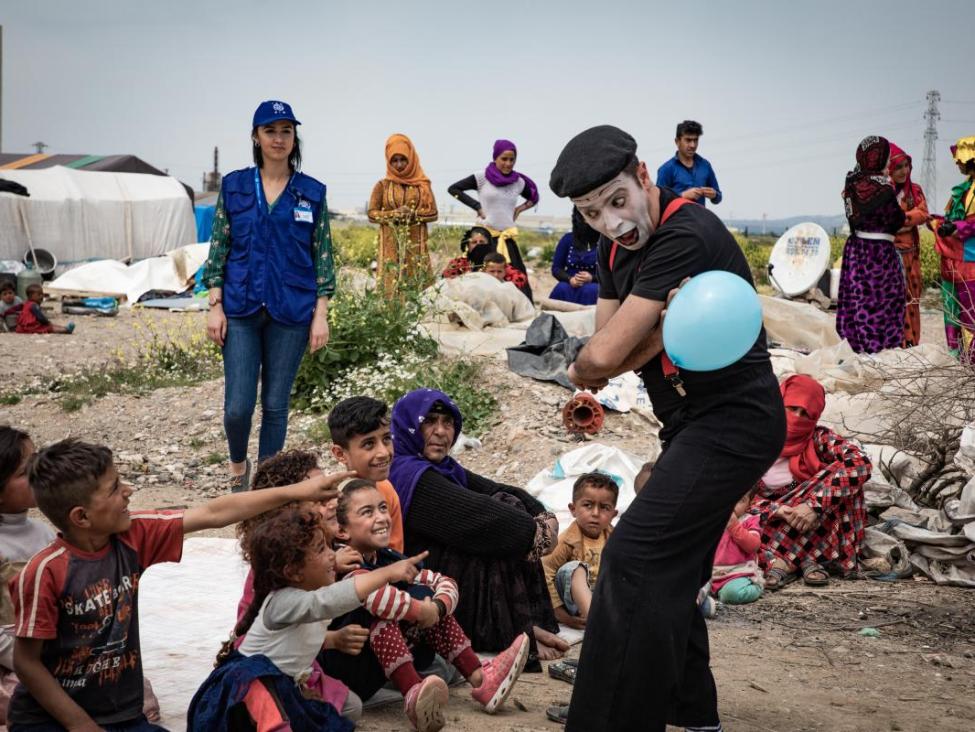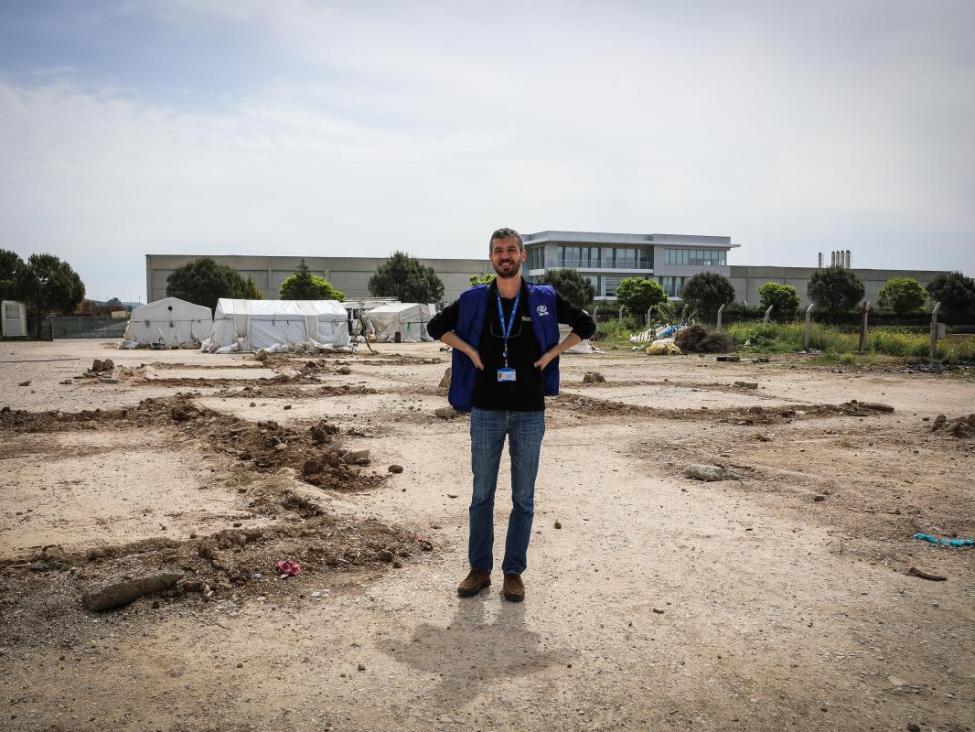-
Who We Are
WHO WE AREThe International Organization for Migration (IOM) is part of the United Nations System as the leading inter-governmental organization promoting humane and orderly migration for the benefit of all. IOM has had a presence in Türkiye since 1991.
About
About
IOM Global
IOM Global
-
Our Work
Our WorkAs the leading inter-governmental organization promoting since 1951 humane and orderly migration, IOM plays a key role to support the achievement of the 2030 Agenda through different areas of intervention that connect both humanitarian assistance and sustainable development. Across Türkiye, IOM addresses the full scope of migration issues, supporting and developing government capacity to manage migration.
Cross-cutting (Global)
Cross-cutting (Global)
- Data and Resources
- Take Action
- 2030 Agenda
Izmir, Turkey -- Tuesday marked Children’s Day in Turkey, a national holiday celebrated widely throughout the country. Officially recognized as “National Sovereignty and Children’s Day”, April 23rd also marks the day the National Assembly of Turkey was founded in 1920.
IOM Turkey recognized the day with a special series of events across the country in the provinces of Hatay, Şanliurfa, Gaziantep, and Izmir. IOM Mobile Psychosocial Support teams organized activities with local partners, bringing together Turkish and Syrian refugee children and families.
I spent the day with our newest mobile team in the western city of Izmir, who started working in refugee settlements last September. Izmir is Turkey’s third largest city with a population of 4.3 million including 143,000 registered Syrian refugees. I hopped on a rented bus with our team and the Duvara Karşı Tiyatro Topluluğu theater group made up of two clowns, a pantomime, a witch, and a man on stilts.
Vedat Kuşku, the founder of the theater group, started it 26 years ago to bring art and comedy to the streets of Turkey. He is half Roma and half Armenian and says music and performance played an influential role in his childhood. He runs a small theater school in Izmir and many of his students join him in giving free public shows. “I don’t believe in borders between countries or people,” Vedat says in describing his group’s goal of making comedy accessible to all. The group has performed in refugee camps across southeastern Turkey, and more recently with IOM in the refugee tent settlements in Torbalı District in Izmir.
Torbalı District in western Izmir is an industrial city with a special organized industrial zone. Tobacco, cotton, and food products are the main industries located in one of Turkey’s most fertile areas. Marble, machinery, textile, and furniture production have also developed significantly over the years. In 2015, Torbalı produced $774 million USD worth of exports.
Contributing to Torbalı’s economic success are the more than 15,000 Syrian refugees working in the fields and factories across the district. Having fled the war in Syria, many first lived in cities like Hatay in the southeast before making their way west to Izmir. Drawn to Torbalı with the promise of work, refugees sometimes go for months without working because the jobs are seasonal. Most of them live in the approximately 24 tent settlements scattered across the district and have no plumbing or running water. Some might get lucky and live in a settlement that has one shared electrical connection, allowing one lamp per tent.
IOM’s mobile team started working in tent settlements and community centers in Torbalı and Bornova districts last Fall, organizing activities to help families access basic services and improve daily life. The team has a social worker and a psychologist who help decide what types of activities the group might put on that would take the focus off the refugee families’ hardships and strengthen their ties with the local Turkish community. Activities have ranged from today’s theater act, to awareness-raising sessions on legal issues pertaining to refugees, anti-bullying, child yoga, and cooking. They help inform refugee families, expose them to key issues, and overall contribute to their integration in Turkey.
We set off with the theater group to perform in three tent settlements. The first was located next to Alfemo Fabrikası, a furniture factory. When we arrived, our MPSS team was surprised to see that about half of the community had left over the last few days. Because of the seasonal nature of agricultural work, most of the families who live in the tent settlements only stay temporarily for a few months and then leave in search of work elsewhere. Ali Rıdvanoğulları, the MPSS team’s social worker, showed me the marks in the dirt where about 15 tents had stood just a few days earlier.
Mr. Khalil Al Gayah, a former electrician from Deir Zor northern Syria, has spent five years in Turkey, living for three years in Adana in the southeast before moving with his family to Izmir. He and his five children and 12 grandchildren are spread out across four different tents, occupying a prime corner of the settlement.
Khalil looked on as the pantomime entertained his grandchildren. The clown (Vedat) interacted with the children through sounds instead of words, which they repeated in unison. Vedat was aware that most of the kids did not understand Turkish, since many were very little and those of school age are not in school because their parents prefer to send them to work, or the school is too far to get to.
The second settlement we visited was more lively livelier and had about twice as many kids. There were mainly women and children around, with very few men, which meant that the men had probably found work that day. “Middlemen call them when they find work for them in the fields. Sometimes they work on a daily basis, sometimes weekly. The average salary is 60 Turkish lira ($10) per day and their rent for the land for their tent is 150 lira ($25) per month,” says social worker Ali, who is drawing on the information he collected from one of the focus group discussions the team organized with the families.
It’s not just the men who work – the women also work in the fields. Ratse, a young woman we met at the third tent settlement, said she brings her three-year-old daughter with her when she goes to work in the bean and tomato fields. She and her family are also from Deir Zor, Syria, and have been here for three years. “I wish the war in Syria would end so we can go back home and be with the rest of our family. I’ve been working hard here in Turkey, I just need a break,” she said as she picked up her daughter, who came by blowing bubbles given out to the kids by the theater group.
Ratse realizes, though, that with the war in Syria not over, her family and other refugees like her will have to continue to rely on the generosity of Turkey as the world’s largest refugee-hosting country, and the services offered by its government, UN agencies, and humanitarian groups. Children like her daughter and the hundreds of others living in tent settlements across Torbali will need help to go to school. They face many barriers to education – their parents don’t make enough money to support them, transportation is a challenge, lack of proper nutrition affects their health, etc. Child labour and early and forced marriage are also big issues.
We wrapped up the show at the third tent settlement and said goodbye to the kids and families, the witch and clown hugging the kids tightly as they parted. Today’s visit was a highlight for these kids – and probably one of the most exciting and memorable days of their lives.
IOM’s mobile teams are supported by the Swiss Agency for Development and Cooperation and the United States Bureau for Population, Refugees, and Migration.






